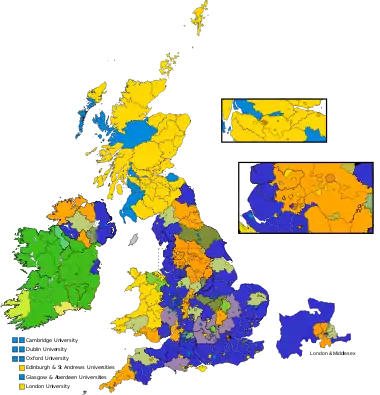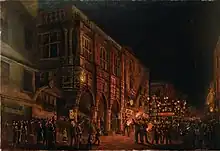1880 United Kingdom general election
The 1880 United Kingdom general election was a general election in the United Kingdom held from 31 March to 27 April 1880.
| |||||||||||||||||||||||||||||||||||||||||||||
All 652 seats in the House of Commons 327 seats needed for a majority | |||||||||||||||||||||||||||||||||||||||||||||
|---|---|---|---|---|---|---|---|---|---|---|---|---|---|---|---|---|---|---|---|---|---|---|---|---|---|---|---|---|---|---|---|---|---|---|---|---|---|---|---|---|---|---|---|---|---|
| |||||||||||||||||||||||||||||||||||||||||||||
 Colours denote the winning party | |||||||||||||||||||||||||||||||||||||||||||||
| |||||||||||||||||||||||||||||||||||||||||||||
Its intense rhetoric was led by the Midlothian campaign of the Liberals, particularly the fierce oratory of Liberal leader William Gladstone.[2] He vehemently attacked the foreign policy of the government of Benjamin Disraeli, Earl of Beaconsfield, as utterly immoral.
Liberals secured one of their largest-ever majorities, leaving the Conservatives a distant second. As a result of the campaign, the Liberal Commons leader, Spencer Cavendish and that in the Lords, Lord Granville, stood back in favour of Gladstone, who thus became Prime Minister a second time. It was the last general election in which any party other than the Conservatives won a majority of the votes (rather than a plurality).
Issues

The Conservative government was doomed by the poor condition of the British economy and the vulnerability of its foreign policy to moralistic attacks by the Liberals. William Gladstone, appealing to moralistic evangelicals, led the attack on the foreign policy of Benjamin Disraeli (now known as Lord Beaconsfield) as immoral.[3] Historian Paul Smith paraphrases the rhetorical tone which focused on attacking "Beaconsfieldism" (in Smith's words) as a:
Sinister system of policy, which not merely involved the country in immoral, vainglorious and expensive external adventures, inimical to peace and to the rights of small peoples, but aimed at nothing less than the subversion of parliamentary government in favour of some simulacrum of the oriental despotism its creator was alleged to admire.[4]
Smith notes that there was indeed some substance to the allegations, but: "Most of this was partisan extravaganza, worthy of its target's own excursions against the Whigs."[5]

Disraeli himself was now the Earl of Beaconsfield in the House of Lords, and custom did not allow peers to campaign. His party was unable to deal effectively with the rhetorical onslaught. Although he had improved the organisation of the Conservative Party, Disraeli was firmly based in the rural gentry, and had little contact with or understanding of the urban middle class that was increasingly dominating his party.
Besides their trouble with foreign policy issues, it was even more important that the Conservatives were unable to effectively defend their economic record on the home front. The 1870s coincided with a long-term global depression caused by the collapse of the worldwide railway boom of the 1870s which previously had been so profitable to Britain. The stress was growing by the late 1870s; prices fell, profits fell, employment fell, and there was downward pressure on wage rates that caused much hardship among the industrial working class. The free trade system supported by both parties made Britain defenceless against the flood of cheap wheat from North America, which was exacerbated by the worst harvest of the century in Britain in 1879. The party in power got the blame, and Liberals repeatedly emphasised the growing budget deficit as a measure of bad stewardship. In the election itself, Disraeli's party lost heavily up and down the line, especially in Scotland and Ireland, and in the urban boroughs. His Conservative strength fell from 351 to 238, while the Liberals jumped from 250 to 353. Disraeli resigned on 21 April 1880.[6]
Results

| UK General Election 1880 | |||||||||||||||
|---|---|---|---|---|---|---|---|---|---|---|---|---|---|---|---|
| Party | Candidates | Votes | |||||||||||||
| Stood | Elected | Gained | Unseated | Net | % of total | % | No. | Net % | |||||||
| Liberal | 499 | 352 | +132 | -22 | +110 | 53.99 | 54.66 | 1,836,423 | +2.7 | ||||||
| Conservative | 521 | 237 | +20 | -133 | −113 | 36.35 | 42.46 | 1,426,351 | −1.8 | ||||||
| Home Rule | 81 | 63 | +6 | -3 | +3 | 9.66 | 2.84 | 95,535 | −0.9 | ||||||
| Independent | 2 | 0 | 0 | 0 | 0 | 0 | 0.03 | 1,107 | 0 | ||||||
Voting summary
Seats summary
Regional results
Great Britain
.svg.png.webp)
| Party | Seats | Seats change | Votes | % | % change | |
|---|---|---|---|---|---|---|
| Liberal | 334 | 1,780,171 | 57.3 | |||
| Lib-Lab | 3 | |||||
| Conservative | 214 | 1,326,744 | 42.7 | |||
| Other | 0 | 1,107 | 0.04 | |||
| Total | 551 | 3,108,022 | 100 | |||
England
| Party | Seats | Seats change | Votes | % | % change | |
|---|---|---|---|---|---|---|
| Liberal | 251 | 1,519,576 | 56.2 | |||
| Lib-Lab | 3 | |||||
| Conservative | 197 | 1,205,990 | 43.7 | |||
| Other | 0 | 1,107 | 0.1 | |||
| Total | 451 | 2,726,673 | 100 | |||
Scotland
| Party | Seats | Seats change | Votes | % | % change | |
|---|---|---|---|---|---|---|
| Liberal | 52 | 195,517 | 70.1 | |||
| Conservative | 6 | 74,145 | 29.9 | |||
| Total | 58 | 269,662 | 100 | |||
Wales
| Party | Seats | Seats change | Votes | % | % change | |
|---|---|---|---|---|---|---|
| Liberal | 29 | 50,403 | 58.8 | |||
| Conservative | 4 | 41,106 | 41.2 | |||
| Total | 33 | 100,509 | 100 | |||
Ireland
| Party | Seats | Seats change | Votes | % | % change | |
|---|---|---|---|---|---|---|
| Home Rule | 63 | 95,535 | 37.5 | |||
| Irish Conservative | 23 | 99,607 | 39.8 | |||
| Liberal | 15 | 56,252 | 22.7 | |||
| Total | 101 | 251,394 | 100 | |||
Universities
| Party | Seats | Seats change | Votes | % | % change | |
|---|---|---|---|---|---|---|
| Conservative | 7 | 5,503 | 49.2 | |||
| Liberal | 2 | 5,675 | 50.8 | |||
| Total | 9 | 11,178 | 100 | |||
See also
References
- "Data" (PDF), parliament.uk
- Fitzsimons 1960, pp. 187–201.
- Matthew 1997, pp. 293–312.
- Smith 1996, pp. 198–99.
- Smith 1996, p. 199.
- Smith 1996, pp. 202–3; Blake 1967, pp. 707–13, 717.
Sources and further reading
- Blake, Robert (1967), Disraeli, EA London, ISBN 978-1-84413-312-3
- Chilston, Viscount. "The 1880 Election: A Historical Landmark." Parliamentary Affairs 14 (June 1961): 477-492.
- Craig, F. W. S. (1989), British Electoral Facts: 1832–1987, Dartmouth: Gower, ISBN 0900178302
- Fitzsimons, M. A. (1960), "Midlothian: the Triumph and Frustration of the British Liberal Party", Review of Politics, 22 (2): 187–201, doi:10.1017/S0034670500008202, JSTOR 1405317
- Lloyd, T.O. "The General Election of 1880 (Oxford UP, 1967)
- Matthew, H. C. G. (1997), Gladstone: 1809–1898, Clarendon Press, ISBN 0-19-820696-8
- Rallings, Colin; Thrasher, Michael, eds. (2000), British Electoral Facts 1832–1999, Ashgate Publishing Ltd
- Roberts, Matthew. "Election Cartoons and Political Communication In Victorian England.' Cultural & Social History (2013) 10#3 pp 369–395, covers 1860 to 1890.
- Smith, Paul (1996), Disraeli: A Brief Life, Cambridge UP, ISBN 9780521381505


